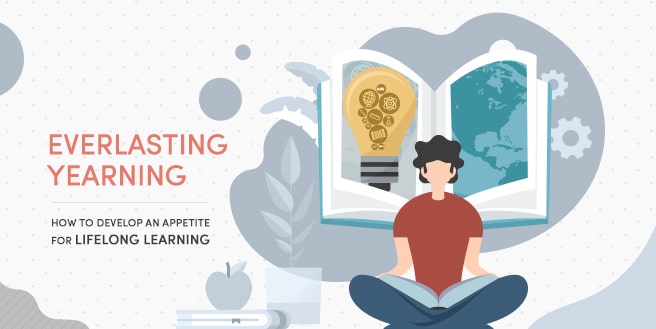How to Steadily Develop an Appetite for Lifelong Learning
There was a time in our life when our idea of learning stuck within the four walls of the classroom and though the adults around us would always tell us for the rest of the duration of our younger years that it doesn’t necessarily end where school stops, it will take us a while to realize that they’re actually right.
In our lifetime, there’s a large chance that we would come across people or certain individuals that just love to learn. Acquaintances that would take up another course right after their first ones or workmates who are earnestly working hard to pay for their master’s degree and then there’s that one person whose education doesn’t rely on the traditional method.
They’re the ones we call lifelong learners – people who crave for knowledge that they can apply in real life, day by day. They would read books depending on whatever they are going through at the moment with the idea that it would help them come up new solutions to their current problems. They would use today’s technology to learn new things through different courses found both online and offline and they are always out to find more opportunities to grow – these are lifelong learners, individuals with an everlasting yearning for edification. Some are born with this kind of hunger, while there are some that develop it as they engage themselves with new ways to earn knowledge.
It may seem extensive to a large majority of us but it’s quite the investment, bringing to the table more than what is being asked from us.
The Benefits of Becoming a Student of Life
Medically speaking, aside from its grey matter, the brain contains muscle – that like any other muscle, needs to be exercised for it to be stronger. But aside from this obvious advantage, it carries with it helping hands in other fields.
According to a study on the benefits of lifelong learning from the year 2012, the aforementioned habit helps sharpen the mind, increases confidence, enhances interpersonal skills, expands career opportunities as well as impacts that ability to effectively communicate with other individuals.
Whenever we learn, we develop our knowledge base – breaking old patterns or routines and resulting to an increased confidence in creating. It rids us of the feeling of complacency and in turn pushes to enhance our skills as well as add more to our metaphorical tool box. In addition to this, it’s also good for our health. Though admittedly, it may not cure critical diseases like Alzheimer’s, it still helps in slowing down its progression. Something as small as reading for a short period of time everyday can also alleviate stress levels.
But in order to become a student of life, you must train your brain to have a constant yearning for new things to learn.
Training Your Brain to Crave Learning
Whenever we kick start a new habit and easily notice changes, the more we are prone to doing it again and again. So in order for our brains to have an everlasting yearning for learning, we must train it.
Start by creating an objective for your learning. Say for example, your objective maybe to develop a new skill or to reduce your stress levels. After doing so, start small by setting up a 15-minute read two to three times per week – this method is applicable for those who aren’t naturally keen on learning. It helps to break down information into bite sized pieces so they won’t have a hard time sticking to the habit. And lastly, make it fun. Learning doesn’t have to be a chore, you have every opportunity to make it more engaging like turning it into a game.
The world can be your greatest teacher – and not just academically speaking. When you stick by the right group of people, they can educate you on different fields, including life itself. And if you’re looking for a community filled to the brim with students of life, look no further. Just talk to us today and we’ll introduce you to them!













Leave a Reply
Want to join the discussion?Feel free to contribute!